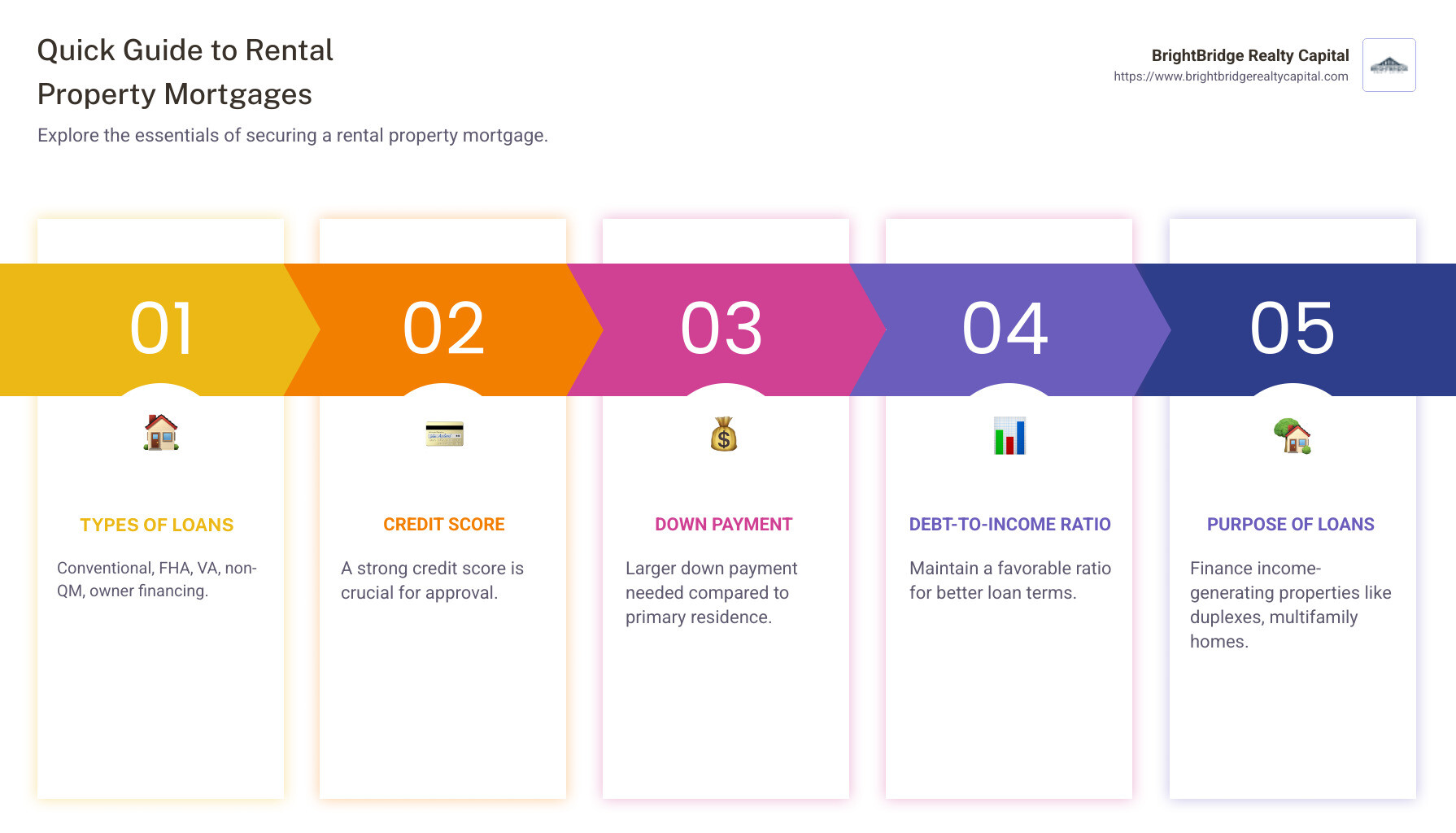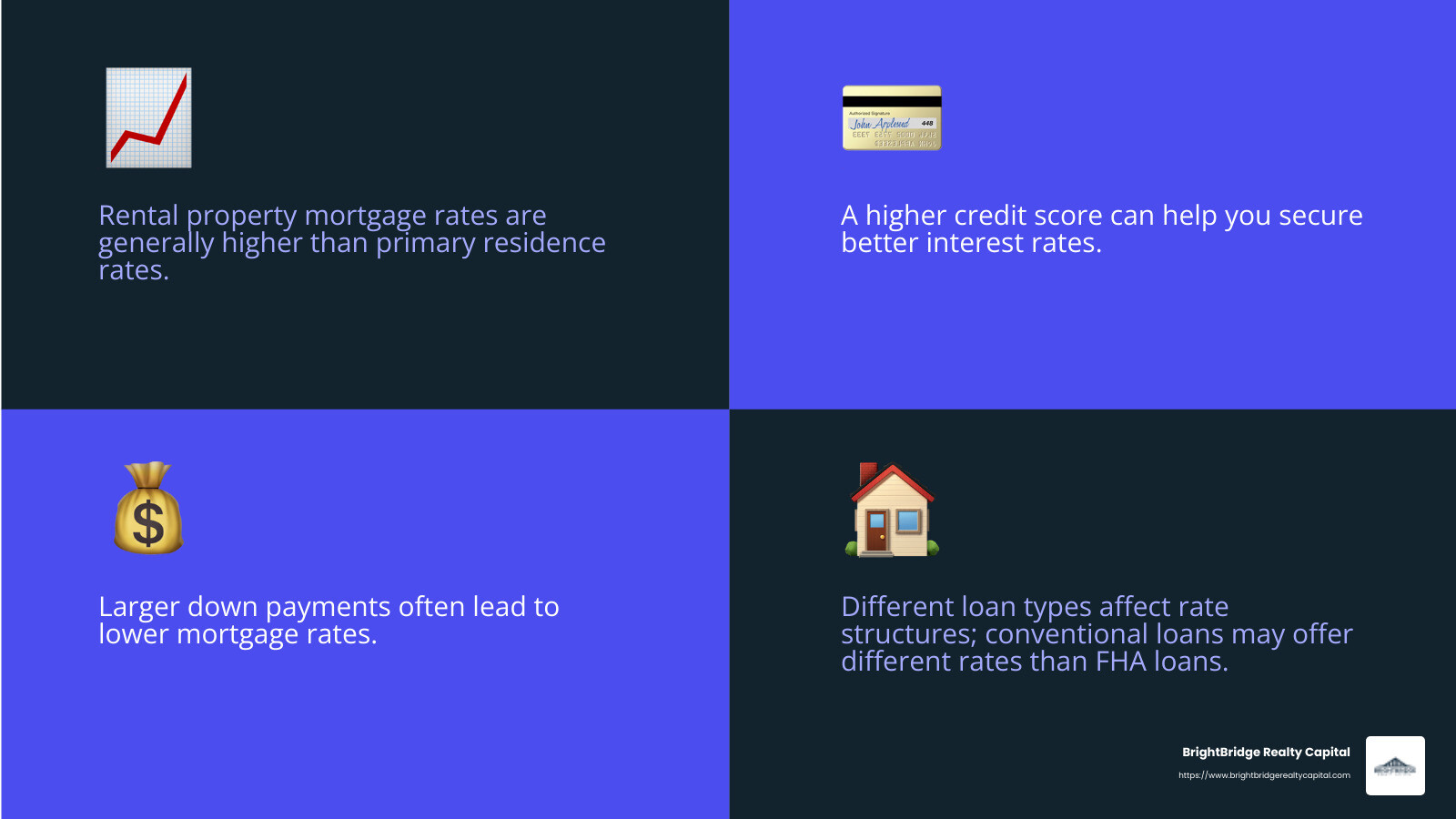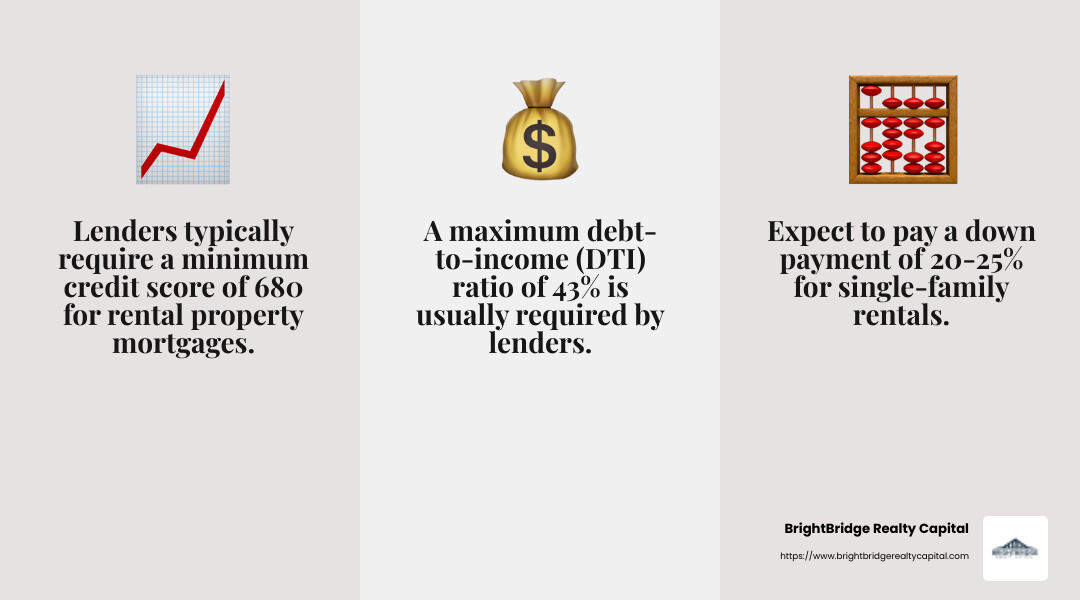Rent and Repeat: Taking Out a Mortgage on a Rental Property

Taking out a mortgage on a rental property can seem complex, but understanding the essentials can smooth the path to expanding your real estate portfolio.
Quick Answer:
- Types of Loans: Conventional, FHA, VA, non-QM, and owner financing.
- Requirements: Strong credit score, larger down payment than a standard home purchase, and favorable debt-to-income ratio.
- Purpose: To purchase income-generating properties like duplexes, multifamily homes, or single-family houses intended for rental.
Investing in real estate is a strategic move for generating income. But, securing the right mortgage is key to maximizing that investment. Rental property mortgages are designed to fund properties you rent out for income, from multifamily homes to condos. These loans often come with higher rates and larger down payment requirements compared to loans for primary residences.
At BrightBridge Realty Capital, we make it easier. We understand the nature of real estate investing and offer solutions custom to meet your needs with competitive rates and quick closings.

Understanding Rental Property Mortgages
When you're taking out a mortgage on a rental property, it's important to grasp the basics of rental property mortgages. These loans are different from those for primary residences. They cater to purchasing properties intended for rental income, such as apartments, duplexes, or single-family homes.
Income Property Mortgage
An income property mortgage is a specific type of loan designed for buying rental properties. It's crucial for investors aiming to generate income through rent. Unlike traditional home loans, these mortgages are often harder to qualify for. Why? Lenders see rental properties as riskier investments. This means stricter requirements, like higher credit scores and larger down payments.
Investment Property Loans
Investment property loans are another term for the mortgages used to buy rental properties. They help investors expand their real estate portfolios. But, these loans often come with higher interest rates compared to loans for owner-occupied homes.
Why the higher rates? Lenders anticipate more risk because you're not living in the property. You're relying on rental income to cover the mortgage, which can be unpredictable.
Rental Property Mortgage Rates
Rental property mortgage rates tend to be higher than those for primary residences. This is due to the perceived risk involved with non-owner-occupied properties. Lenders want to ensure they're compensated for the increased risk of default.
However, rates can vary based on several factors:
- Credit Score: A higher score can help secure better rates.
- Down Payment: Larger down payments can lead to lower rates.
- Loan Type: Different loan types, like conventional or FHA loans, come with different rate structures.

At BrightBridge Realty Capital, we offer competitive rates custom to your investment goals. Whether you're buying a single-family rental or a multi-unit building, understanding these elements can help you make informed decisions and optimize your investment strategy.
Taking Out a Mortgage on a Rental Property
When you're ready to dive into rental property investment, understanding the key requirements for taking out a mortgage on a rental property is crucial. Let's break down the essentials: minimum credit score, down payment requirements, and debt-to-income ratio.
Minimum Credit Score
A good credit score is your ticket to better loan terms. For rental property mortgages, lenders typically look for a minimum credit score of 680. However, having a score of 740 or higher can open up even better rates and terms. A higher credit score shows lenders that you're a reliable borrower, reducing their risk.
Down Payment Requirements
When it comes to down payments, expect to dig a bit deeper into your pockets compared to primary residence loans. Most lenders require a down payment of 20-25% for single-family rental properties. If you're eyeing a multi-unit property (2-4 units), the down payment can jump to 30% or more. But there's good news: Fannie Mae has introduced programs allowing lower down payments for owner-occupied 2- to 4-unit properties. As of November 2023, you might qualify with just a 5% down payment under specific conditions.
Debt-to-Income Ratio
The debt-to-income (DTI) ratio is another critical factor lenders scrutinize. This ratio compares your monthly debt payments to your income. For rental property mortgages, lenders typically require a maximum DTI ratio of 43%. This means your total monthly debt payments, including the new mortgage, shouldn't exceed 43% of your monthly income. Keeping your DTI low shows lenders that you can manage your debts responsibly, increasing your chances of approval.

By meeting these requirements, you position yourself as a strong candidate for a rental property mortgage. The better your financial profile, the more favorable the loan terms you can secure.
Next, we'll explore the different types of loans available for rental properties, helping you choose the best option for your investment strategy.
Types of Loans for Rental Properties
When you're venturing into real estate investment, choosing the right loan is key. Here's a breakdown of the main types of loans for rental properties:
Conventional Loans
Conventional loans are popular for those buying investment properties. These loans don't require you to live in the property. However, they come with stricter requirements. You generally need a credit score of at least 620, and down payments can range from 15% to 25%, depending on the property type. Conventional loans also have competitive interest rates, but they can be higher than those for primary residences.
FHA Loans
FHA loans are great if you plan to live in one of the units of a multi-family property. With an FHA loan, you can secure a property with as little as 3.5% down. However, you must meet specific conditions, such as living in one of the units for at least 12 months. FHA loans are more lenient with credit scores, making them accessible for many first-time investors.
VA Loans
VA loans are an excellent option for eligible military members and veterans. These loans offer the benefit of no down payment and favorable terms if you live in one of the units. VA loans can be used to purchase properties with up to seven units, provided you occupy one of them. This makes them a versatile choice for those who qualify.
Non-QM Loans
Non-QM (Non-Qualified Mortgage) loans are for investors who might not meet the standard documentation requirements. These loans are more flexible but often come with higher interest rates and larger down payment needs. They're ideal if you have unique financial situations, like irregular income or are self-employed.
Owner Financing
Owner financing is a less traditional route where the seller acts as the lender. This can be a good option if you struggle to qualify for traditional loans. However, these arrangements often include a balloon payment, meaning you'll need to pay off the loan balance in a shorter period, usually within five to ten years. It's crucial to negotiate favorable terms and understand the risks involved.
Choosing the right loan depends on your financial situation, the property type, and your long-term investment goals. Each loan type has its pros and cons, so weigh your options carefully to find the best fit for your strategy.
Next, we'll dig into how to qualify for a rental property mortgage, ensuring you're prepared to secure the financing you need.
How to Qualify for a Rental Property Mortgage
Securing a mortgage for a rental property can be a bit more challenging than for a primary residence. Here's what you need to know to improve your chances of approval:
Credit Score Requirements
Your credit score is crucial when taking out a mortgage on a rental property. Most lenders require a minimum score of 680. However, having a score of 740 or higher can help you secure better interest rates and terms. If your credit score needs a boost, consider strategies like paying off outstanding debts or requesting credit line increases.
Cash Reserves
Lenders want to ensure you can handle unexpected expenses. Having cash reserves is essential. Typically, you need to have enough to cover at least six months of mortgage payments. For those with multiple rental properties, some lenders might require reserves for up to 12 months. These reserves can include savings or even a percentage of your retirement accounts.
Income Verification
Proving your ability to manage the mortgage payments is key. Lenders often require documentation like two years of tax returns (Form 1040, Schedule E), W-2s, or profit and loss (P&L) statements. If you have existing rental properties, showing consistent rental income through lease agreements and bank statements will strengthen your application. For self-employed investors, detailed P&L statements are particularly important.
Meeting these qualifications can make the process smoother and improve your chances of approval. Each lender might have slightly different requirements, so shop around and find the best fit for your financial situation.
Next, we'll address frequently asked questions about rental property mortgages, including interest rates and tax implications.
Frequently Asked Questions about Rental Property Mortgages
What are the typical interest rates for rental property mortgages?
Interest rates for rental property mortgages are generally 1-3% higher than those for primary residences. This is because lenders see rental properties as riskier investments. For instance, if you're buying a single-family rental, expect higher rates compared to the mortgage on your own home.
How can I improve my chances of getting approved?
Improving your chances of getting approved for a rental property mortgage can be straightforward:
Boost Your Credit Score: Aim for a score of 740 or higher. Pay off debts and maintain low credit card balances to improve your score.
Increase Your Down Payment: While the minimum down payment is often 20-25% for single-family rentals, offering more upfront can make you a more attractive borrower.
Manage Your Debt-to-Income Ratio: Keep your DTI ratio below 43%. This means your monthly debts should be less than 43% of your monthly income.
Maintain Cash Reserves: Ensure you have at least six months of mortgage payments saved up. This shows lenders you can handle unexpected expenses.
What are the tax implications of owning a rental property?
Owning a rental property comes with specific tax implications and benefits:
Tax Benefits: You can deduct expenses like mortgage interest, property management fees, and repair costs from your taxable income. This can significantly reduce your tax bill.
Rental Income Reporting: All rental income must be reported to the IRS. This includes rent payments and any other fees you collect from tenants.
Depreciation: You can also claim depreciation on the property, which allows you to deduct a portion of the property's cost over several years.
Understanding these tax implications can help you make the most of your investment. Always consider consulting a tax professional to ensure you’re maximizing your benefits and staying compliant with tax laws.
Conclusion
Taking out a mortgage on a rental property can be a complex process, but it doesn't have to be daunting. At BrightBridge Realty Capital, we specialize in making this journey as smooth as possible for real estate investors like you.
Our commitment to fast closings means you can seize opportunities quickly—often wrapping up the loan process in just one week. This speed is crucial in the competitive real estate market, where timing can make all the difference.
We also pride ourselves on direct lending, which eliminates intermediaries and keeps your costs down. By working directly with us, you benefit from competitive rates and a seamless process custom to your unique investment strategy. Whether you're expanding your rental portfolio or venturing into real estate for the first time, our nationwide services are designed to meet your needs.
Explore our loan options and find how we can help you achieve your real estate goals with ease and confidence.
At BrightBridge Realty Capital, we're here to bridge the gap between your investment dreams and reality. Let's make your next real estate move a success!


